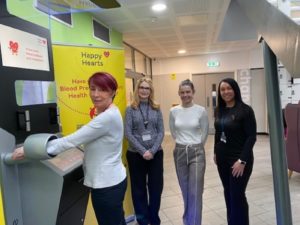By Dr Mel Roche, Consultant in Public Health, Champs Public Health Collaborative Support Team
In recent years, Wellpoint kiosks have played an important role in community-based blood pressure (BP) testing and health and wellbeing signposting across Cheshire and Merseyside (C&M).
While use of the kiosks was paused for much of 2020/21 due to the COVID-19 pandemic, last autumn use of this innovative approach to BP testing, prevention and community empowerment was successfully revived in 12 Cheshire and Merseyside locations, with over 4,000 BP tests undertaken by nearly 3,000 users in the eight months since September 2021.
The Wellpoint Kiosk is a state-of-the-art touchscreen, self-service health kiosk that can be placed in a wide range of community locations. In addition to measuring blood pressure, weight, body mass index (BMI) and other metrics, the kiosk can provide an estimate of the user’s risk of developing cardiovascular disease (including heart attack and stroke) in the next 10 years. Personalised results and advice are produced instantly on a printout ‘receipt’ or sent to users by email. Users can also create a Well.Me account to review results and monitor progress over time.

Photo: Wellpoint Kiosk in Knowsley being used by Cllr Christine Bannon, accompanied by Emma Thomas, Dr Sarah McNulty from Knowsley Council and Lynn Wilson from Volair.
Since last autumn, 12 Wellpoint kiosks have been located in a number of local authority, community pharmacy and NHS Trust settings across C&M, with an emphasis on areas with a high level of deprivation. Since September 2021, Brio Leisure, Winsford (Cheshire West and Chester) and Crewe Lifestyle Centre (Cheshire East) have hosted a kiosk each. Since November 2021, a kiosk has moved between 3 Knowsley Volair Leisure sites Knowsley Leisure & Culture Park, Prescot Soccer Centre and Stockbridge Village and later in the year it will be available at Kirkby and Halewood Leisure Centres.
In addition, between February and May 2022, eight community pharmacies across Liverpool, St Helens and Widnes hosted a kiosk for four months each, and Liverpool Heart and Chest Hospital has continued to provide a kiosk in its staff wellbeing hub throughout the pandemic.
The kiosks are, again, proving popular with the public, with particularly high frequency use seen in the local authority settings. The interim number of kiosk interactions (including blood pressure tests) in each of the main locations so far are as follows:
- Brio Leisure, Winsford: over 2,200 interactions including over 1,400 BP tests by nearly 800 users
- Crewe Lifestyle Centre: nearly 1,800 interactions including over 1,000 BP tests by nearly 700 users
- Knowsley sites collectively: over 1,700 interactions including over 1,000 BP tests by 900 users
- Community pharmacies: over 500 BP tests undertaken. Note, it is felt that the Covid-19 restrictions limited footfall in some pharmacies, limiting kiosk use during the time period they were available (February to May 2022).
- Liverpool Heart and Chest Staff Hub: Over 300 interactions since September 2021, including nearly 200 BP test by over 100 users.
A significant proportion of the BP readings obtained were either high or very high (up to a third, in keeping with previous local findings), and while this is not equivalent to a diagnosis, for many, it will be the first important step on the pathway to detection of high blood pressure and management to reduce risk of heart attack and stroke.
There are over 416,000 known hypertensive patients (patients with high blood pressure) across C&M but many cases remain undiagnosed, and many known patients’ BP is not controlled to target. Recent data suggests that in order to achieve the national BP ambitions of 80% detection by 2029, it is estimated that more than 69,000 additional people with high BP need to be diagnosed across C&M, and more than 41,000 additional known BP patients need improved BP control.
This is a huge task that will need a system-wide response that supports general practice, strengthens the role of community pharmacies (including via the recently launched NHS England and Improvement (NHSEI) Pharmacy BP testing service) and empowers patients and the public. BP kiosks can contribute to that system wide response.
Over the next few months, with input from the host sites, the C&M ICS CVD Prevention Subgroup will evaluate the 2021/22 kiosk workstream in more detail. This will inform the placement of further C&M ICS- funded kiosks over 2022/23, to optimise the future impact on BP detection, management and inequalities. In addition to supporting achievement of the national BP ambitions, the kiosks can contribute to local delivery of the national NHSEI CVD Prevention Recovery plan by supporting general practice and engaging and empowering the public.
For an example of how the kiosk was promoted in Knowsley, click here.
For more information contact melanieroche@wirral.gov.uk